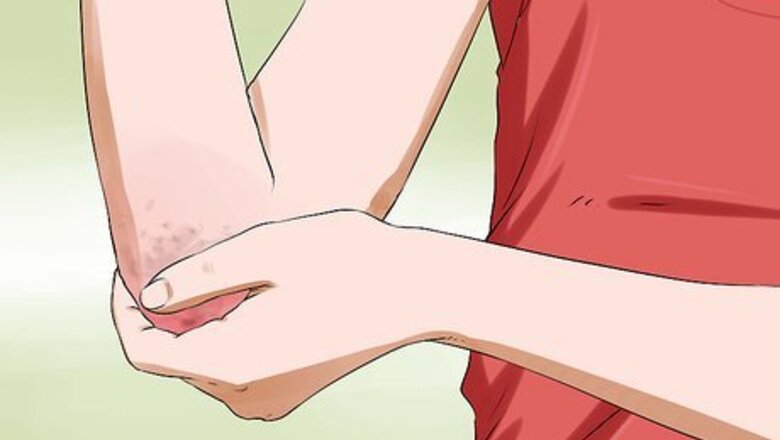
views
X
Trustworthy Source
American Academy of Family Physicians
Organization devoted to improving the health of patients, families, and communities
Go to source
Eczema is more common in infants and children, but it can also affect adolescents and adults. Eczema is due to a complex interplay between your skin and environmental agents, which leads to an immune response.[2]
X
Research source
To know if you have eczema, it is important to check your symptoms, talk to your doctor about your health history and tests, and pay attention to your triggers.
Recognizing Symptoms
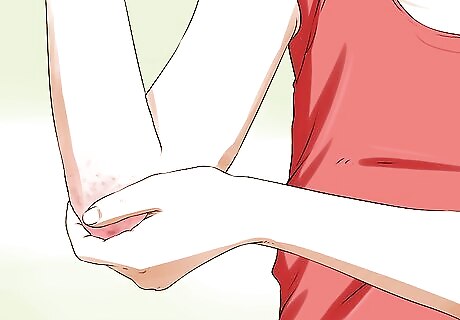
Look out for red to brownish-gray patches on your skin. Eczema often appears as red to brownish-gray colored patches on the skin. These patches can appear almost anywhere on your body if you have eczema. Eczema generally shows up during childhood and will persist until treated, so you may have had these patches for a long time. The most common places to find these discolored patches include: on the insides of your elbows on the backs of your knees on your face, especially on your cheeks behind your ears on your buttocks on your hands and feet on your ankles and wrists on your eyelids on your scalp

Watch out for bumps appearing on the skin. These bumps often appear on the face and scalp of people who have eczema. This condition on the face and scalp is also called "cradle cap," especially on infants. Avoid scratching the bumps because this will cause oozing and crusting. Eczema on the face and scalp is more common in infants, but they can be present in children and adults as well. Some people compare these bumps to scaly pimples in appearance.
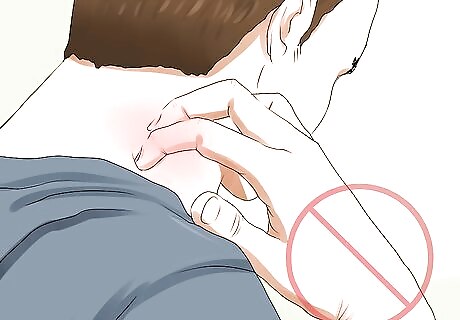
Notice any itching sensation on and around discolored patches. Itchiness is a common symptom of eczema and the itching may get worse at night. Do your best to avoid scratching your skin because it will make matters worse and may lead to swelling and increased sensitivity. When this condition worsens, it can cause redness and swelling. You may also feel a burning sensation, particularly when you scratch the patches in an attempt to relieve the itching sensation. You should avoid scratching because it can cause cracks in your skin and trigger infection.
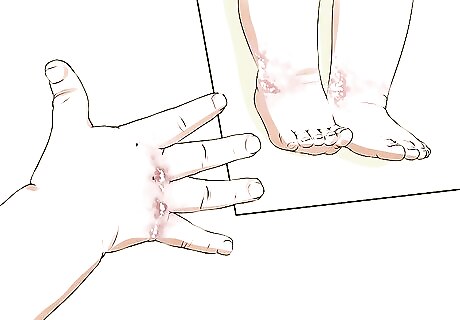
Pay attention to any crusting. Sometimes the discolored eczema patches on your skin may ooze or break open from scratching and then crust over. This is common in eczema, but it is a serious hazard to your health. Any broken skin resulting from eczema puts you at a higher risk of acquiring a virus or bacterial infections, so it is important to get these wounds treated.
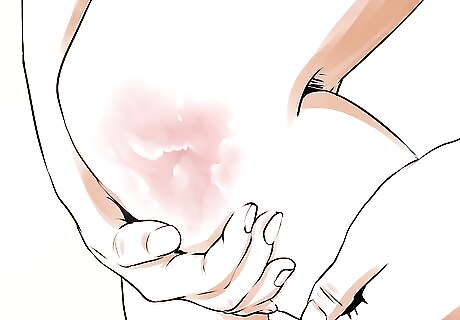
Feel the texture of your skin. Eczema causes patches of your skin to take on a leathery or scaly texture. The scaly or leathery texture is caused by chronic scratching or rubbing of the reddened patches of your skin. Touch your skin to see if the texture has changed. If it feels leathery or scaly, then it may be the result of eczema. These scaly patches might also begin to peel. When they do, your skin will look how it does after you get a sunburn.
Getting Medical Help
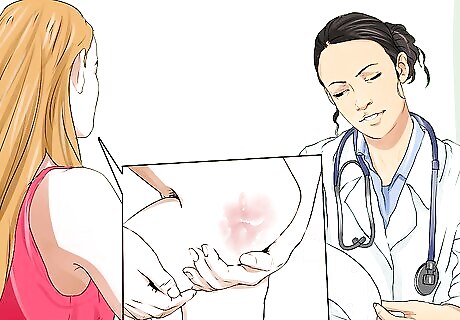
Make an appointment with your doctor. If you have noticed symptoms of eczema, then it is important to make an appointment with your doctor to get a diagnosis. Your doctor will perform a thorough health history to determine if anything else might be causing your symptoms. Tell your doctor about your symptoms including: when you first started to have the symptoms whether you have undergone any treatments for skin problems in the past any recent stress you have been dealing with any cosmetics that irritate your skin any scented soaps, lotions, or detergents that irritate your skin any history of asthma or allergies
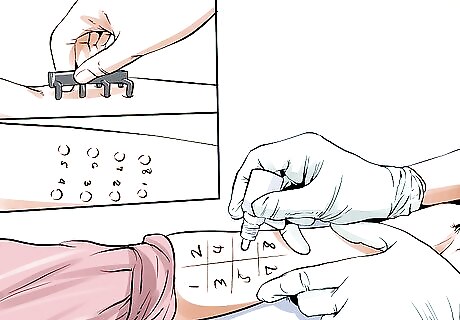
See an allergist and get tested for allergies if necessary. After talking to you and examining your skin, your doctor may decide to refer you to an allergist. An allergist can perform allergy tests to determine if an allergen may be causing your symptoms. If no allergen is found, then your doctor may try a treatment for eczema to see if it helps. If your skin condition improves, then that will confirm that you have eczema. Some common allergy tests include: RAST testing. RAST testing, or radioallergosorbent testing, is a low-risk test to determine allergies. To conduct this test, the immunologist draws blood from the patient. Then, the suspected allergen (such as peanut protein, pet dander, etc.) is combined with the patient's blood in a lab. After that, a radiolabeled IgE human antibody is added to the patient's blood. The antibodies will combine to the allergen. The severity of the response indicates the severity of the allergy. Skin prick test. Skin prick tests are performed under the supervision of a skilled allergist and immunologist. Since they will be exposing you to a potential allergen, anaphylaxis is possible. During the test, you will receive small doses of what you are allergic to (pollen, mold, dander, etc.) either via shots or placed under the tongue.
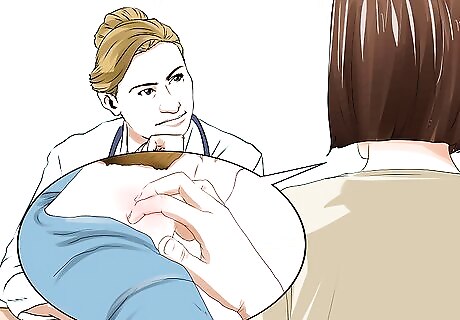
Seek immediate medical attention in severe situations. Sometimes eczema can have severe side effects that require immediate medical treatment. Often, these side effects are the result of an infection due to broken skin. If you have been dealing with eczema on your own for a while, then you should see a doctor as soon as you can. You should also seek immediate medical attention if you: are losing sleep as a result of your eczema or you cannot concentrate because of the itching are experiencing pain on your skin think you might have an infection because you have noticed pus, yellow scabs, and/or red streaks you are having trouble seeing because of patches on your eyelids
Knowing the Risk Factors
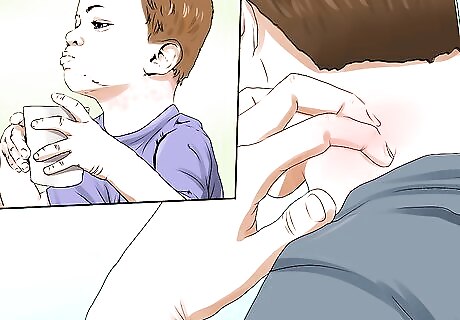
Understand that age plays a factor. Infants and children are more prone to developing eczema than adults. The condition may clear up by the time a child reaches adolescence or it may only flare up now and then. However, it is good to remember that a person of any age can develop this skin condition, it just happens to be more prevalent in younger children. One study found that about 70% of eczema cases resolve by adolescence.

Watch out for triggers. You may be able to reduce the severity of your eczema by knowing what triggers it and taking steps to prevent flare-ups whenever possible. While triggers will be different for everyone, some of the most common triggers of eczema include strong soaps or detergents, synthetic clothing, and perfume. Extreme temperatures, like very hot or very cold days, can also cause eczema. Food can also trigger eczema, particularly in children. Common foods that children are allergic to and may cause eczema include eggs, peanuts, soy, milk, wheat, and fish.
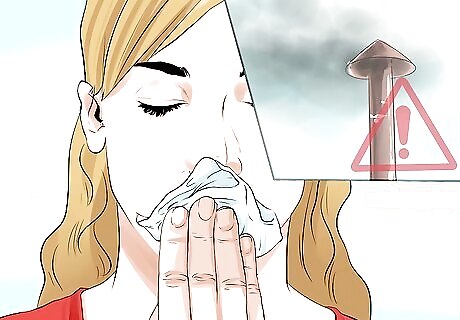
Keep your environment in mind. Individuals are also more likely to develop this condition if they live in urban areas with a high level of pollutants. Some allergens, when inhaled such as molds, dust, pollen, pet dander or cigarette smoke, can aggravate the condition. Do your best to avoid exposure to cigarette smoke and other environmental irritants. Here are some factors that might also exacerbate eczema in individuals: Wool or synthetic clothing Specific soaps, detergents, antiperspirants, and chemicals Preservatives in topically applied products Perfumed products Latex Dust mites Tree and grass pollen A microbial infection or colonization Temperature extremes Humidity Hard water Cooking with gas Proximity to road traffic
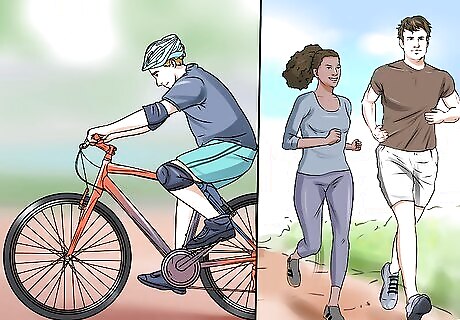
Be aware that stress can bring on an eczema outbreak. Stress may compromise the immune system. It is believed that immunosuppressed individuals are prone and may easily get diseases due to overworking or lack of rest. One of these diseases is eczema. Try your best to manage stress and reduce your risk of having stress-related flare-ups. Some good ways to reduce stress include: doing deep breathing exercises practicing yoga, meditation, or tai chi regular exercise, such as walking, swimming, or biking engaging in hobbies, such as knitting, reading, or cooking



















Comments
0 comment